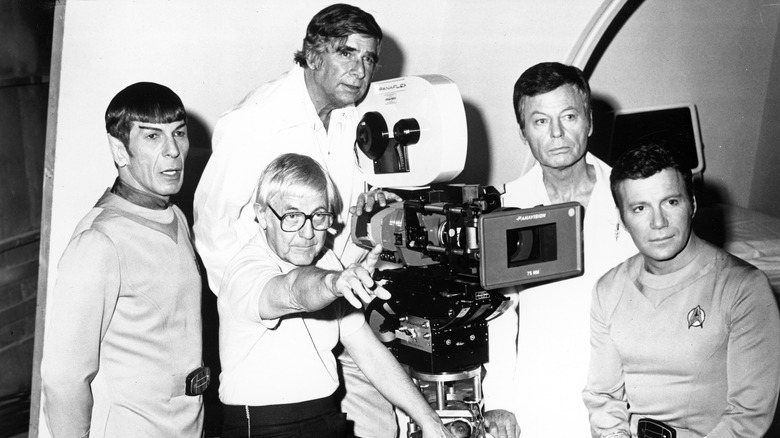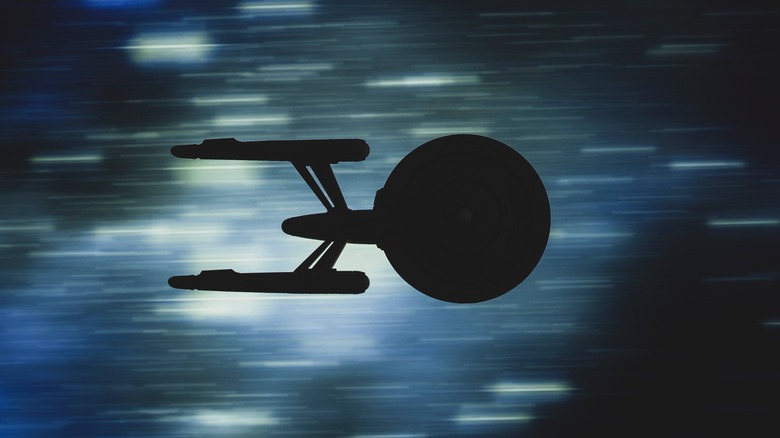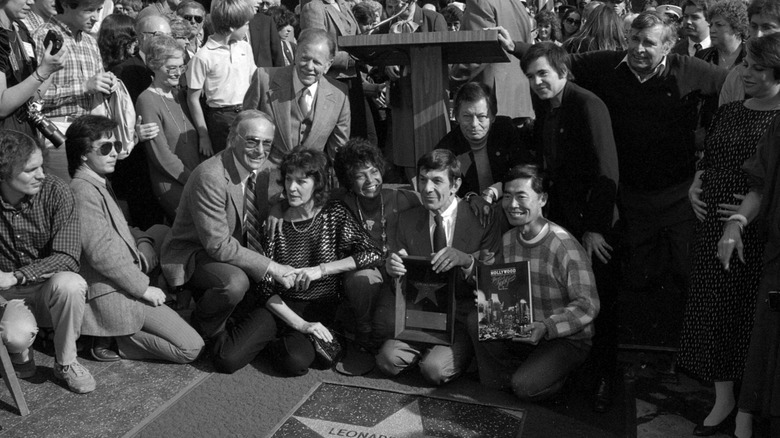The Big Reason Why The Original Star Trek Series Was Canceled
It's hard to even begin to imagine our cultural landscape without "Star Trek." First airing in 1966, its evolved all the way to the present with 12 TV series, 13 movies, countless iconic characters and moments, and more cons and cosplay than you can shake a raktajino (Klingon coffee) at, the "Star Trek" franchise holds a near and dear place in the hearts of many. Possibly most impressive of all, "Star Trek" created a vision of humanity's future that inspired countless real-life astronauts, physicists, engineers — you name it — to boldly go where no one had gone before.
With such an untouchable pedigree, it might seem shocking to think that "Star Trek" almost didn't make the cut back when series creator Gene Roddenberry went around pitching it in the mid-1960s. As the official "Star Trek" website explains, it's only thanks to comedy legend Lucille Ball of Desilu Productions that "Star Trek" got anywhere. NBC's board members didn't really get the show no matter its succinct "Wagon Train to the Stars" tagline, in addition to it being expensive and the sets hard to make. NBC canned the now well-known original pilot, "The Cage," which resulted in a new pilot. The first regular series episode, "The Man Trap," featured a remolded and now-familiar Kirk, Spock, Bones frontperson line-up.
But even so, the original "Star Trek" series only made it to three seasons, and then with difficulty. Ultimately, the show's ratings just weren't high enough to justify its cost. It was only thanks to syndication that it grew into such a beloved franchise.
Decent ratings, but not good enough
From 1949 to the late 1960s, westerns like "Bonanza," "Gunsmoke," "Rawhide," "The Lone Ranger," and "Wagon Train" dominated the airwaves. That last show, "Wagon Train" — featuring a westward-bound, post-Civil War caravan — was one of Gene Roddenberry's templates for "Star Trek," except set in space. The timing was perfect considering the public's increased interest in space exploration via the Cold War-era space race between the United States and the Soviet Union. In fact, "Star Trek" was canceled the same year that the Apollo 11 mission landed on the moon, in 1969.
The public took to "Star Trek" better than the execs at NBC when Lucille Ball had to twist their arm to let them give the show a second pilot. Time Magazine explains that Trek fared well in the ratings, but not well enough. NBC wanted to ax it by the middle of the second season, but fans loved it so much that they kept it alive via a letter-writing campaign that wouldn't look out of place in the modern age. And the funny thing is, if the show had aired on cable TV in the decades to come its ratings would have been considered stellar.
NBC renewed Trek for a third season but with a show-killing caveat: It would air on Friday nights at 10 p.m., at the worst time possible when its predominantly young audience was out and about. Plus, they cut its budget. Fans tried to keep it alive again — but to no avail.
Syndication launched Trek to the stars
We all know that the "Star Trek" story ends in success so rousing that it permanently changed our pop cultural landscape, inspired countless sci-fi shows and novels, and was even integral to fostering the imaginations and energies of generations of NASA employees. NASA has a decades-long, close-knit relationship with the "Star Trek" community and the show's alums, particularly Nichelle Nichols (who played Lt. Uhura) ever since fans successfully petitioned the agency to change the name of its first space shuttle to Enterprise in 1976, after the starship in the original '60s series.
But back when "Star Trek" was originally canceled in 1969 following its third season, no one could foresee the immensity of its impact. In a 2021 Collider interview with Trek-treasure William Shatner — who took a long time to come around to accepting his legacy as Captain Kirk — said that he and his fellow actors were "devastated" that their show had been cancelled. "We all really loved the show, and many of the scripts — people talk about the third season not being as good ... I enjoyed doing it right up until the very end."
"Star Trek's" original 79 episodes went into syndication shortly after the show went off the air, and its popularity ballooned. The first Trek movie, "Star Trek: The Motion Picture," hit theaters in 1979, and by 1986 — one year before "Star Trek: The Next Generation" launched — the original series was the highest-rated syndicated show on TV.


